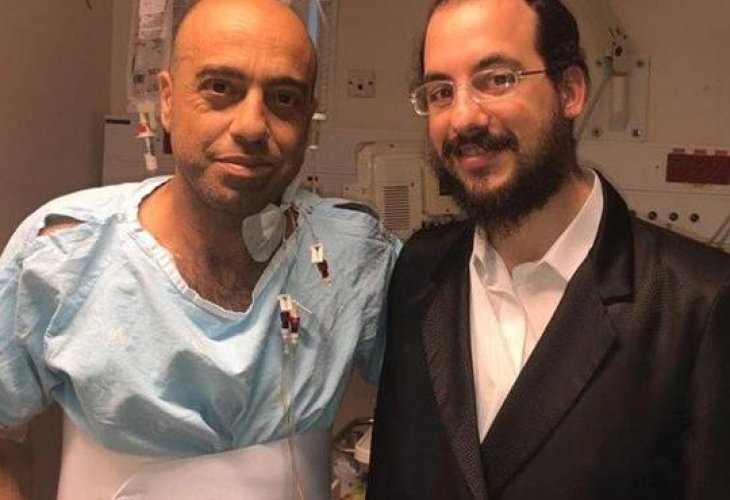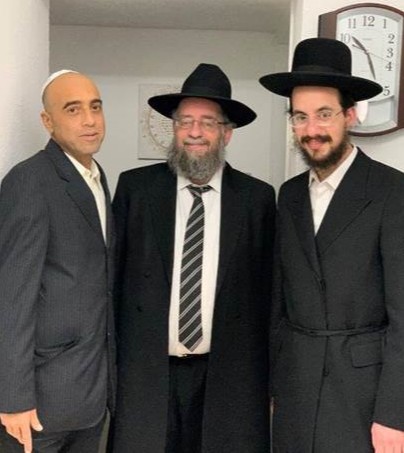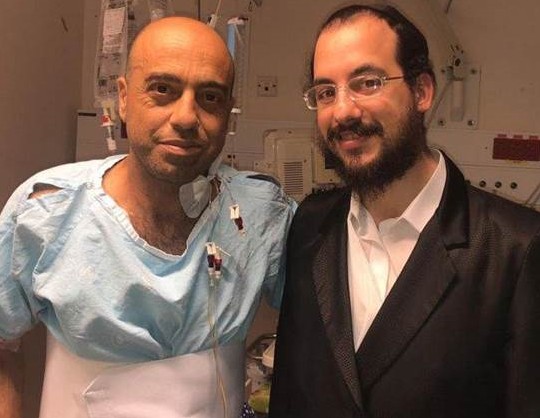Israel Rost: "I Donated a Kidney a Month Ago, and the Excitement Grows Daily"
One month after Israel Rost, a Gur Hasid, donated a kidney to Shai Levy, a restaurateur in Jerusalem, they met to express gratitude and praise. A Hidabroot writer attended and documented the emotional event.

It seems the fierce embrace when Israel Rost, a devout Gur Hasid, and Shai Levy, a disabled IDF veteran working as a restaurateur in Jerusalem, met is the most resounding answer to the dreadful incitement that has been running rampant on the streets for the third time. Had Lieberman participated in this special thanksgiving party, it's doubtful he could have broadcast afterward to incite against the Haredi public.
The location: A small house within Bnei Brak, in a small living room. The participants: Israel Rost (35), kidney donor, Shai (43), kidney recipient, Rabbi Yeshayahu Haber (54), founder of the 'Gift of Life' association, which matches kidney donors and recipients, family members and close friends, and to date has reached nearly 800 kidney donations. The time: One month after the surgery in which Shai received Israel's kidney. The reason: A thanksgiving party, to give thanks and praise for the miracles experienced by the donor and recipient.

"It Was Clear to Me I Was Going to Donate"
In recent years, stories of kidney donors have been heard over and over across sectors, each more moving than the last, but this time it was a special novelty when a Gur Hasid, manager of the "Mesilot" center for child development, donated a kidney to an IDF disabled veteran whom he had never met or heard of before.
The feeling in the room was undoubtedly uplifting. Seeing two people from different ends of Israeli society, proving with their actions that they are one nation - a unique and special people. The meeting also gave participants an opportunity to peek into the world of kidney donors, what they think, and what motivated them. It also provided a narrow glimpse into what happens on the other side - the immense suffering of dialysis patients and the hard lives they have to endure. It was also an opportunity to see the deep appreciation Rabbi Haber receives from all sectors of Israeli society and the great sanctification of Hashem he achieves daily.
Israel Rost, what drove you to donate a kidney?
"I recognized my desire and aspiration to donate a kidney long ago," he shares, "It started from reading 'Gift of Life' newsletters. Every time I came across such a newsletter, I didn't put it down until I read it from start to finish. I flipped through page after page, pages of kidneys and hearts, of endless giving without any compensation, I was entirely moved by these great people who have done the noblest act of their lives and donated a kidney. Jews who saved the lives of another Jew they didn't know before, along with painful descriptions of kidney patients' suffering - led me to a determined decision to also be a partner in this wonderful donation. When I started thinking about the matter, it seemed to me that there was no reason not to go for it. The exposure to such a simple possibility of healing the sick and relieving people of immense suffering left me with thoughts like: 'Why, Master of the Universe, don't I get up and do something?' I still didn't know when, how, or to whom, but one thing was clear to me - I am going to donate a kidney and save lives. From the moment I started the process, it rolled much faster than I thought."
Rost admits the pre-operative process was not short. "First, I examined the risks and checked deeply what the procedure meant medically. It took eight months from my approach to 'Gift of Life' until the surgery itself. Along the way, I underwent many tests, to see if I was indeed eligible. Every deviation from a test required me to improve my body's health, so I benefited doubly. I both saved another person's life and made my body healthier for life."
Rost continues to outline the emotional process: "Two weeks after my initial approach to 'Gift of Life,' Rabbi Haber called me. I was all excited, picking up the phone and hearing the news: 'I found the recipient you are looking for.' I was seized with tremors and excitement, while I replied, 'Really? What should I do now?' I was so eager to donate that I didn't ask who it was about and what their condition was, nothing interested me. I just wanted to move forward. Meanwhile, I received detailed instructions from Rabbi Haber's office about the procedures and initial tests for donor-recipient matching."
According to your descriptions, the testing journey sounds exhausting...
"That's true, but I had very high motivation. There's no doubt it's a big effort to run to tests, and I was anxious about whether the test would pass smoothly, whether I would succeed. The kidney donation is a defining moment in my life, where I realized it's possible to save a person's life by donating an organ that is so necessary for the transplant. Thus, the accompanying effort of the donation significantly diminished."

"It's Harder to Be Publicized Than to Donate a Kidney"
How do you feel today, a month after the donation?
"At first, I didn't feel the magnitude of giving and the accompanying excitement," Rost admits, "But with each passing day, I am more and more excited and realize how much it has given me. My donation to Shai actually gave me much more than it gave him, I started to appreciate the gift of life."
He also adds, "The truth is, I have a very hard time with the publicity, and initially, I wanted to donate the kidney secretly, what you would call 'under the radar.' However, the circumstances unfolded in such a way that it became public. How did Rabbi Haber tell me, 'It's much easier to donate than to be publicized afterward'. But seeing that it strengthens people and sanctifies Hashem's name, I have come to terms with it wholeheartedly.
"Due to my position as manager of the 'Mesilot' center for child development, the donation was exposed to people who are not observant of Torah and commandments, which aroused tremendous surprise on one hand, and on the other hand, endless appreciation and amazement, this is a very great sanctification of Hashem's name".
Now, after the whole process, Rost makes sure to keep close contact with the recipient. "He has become a close friend and true companion, we are in telephone contact every few days and inquire about each other's well-being, usually it goes like this: he calls to thank, and I call to ask how he feels. 'Your kidney inspires me to do good things,' Shai declared to me in one of the conversations".
Shai Levy, who received the kidney, also shares with me his overflowing feelings, and he surprises: "Since the transplant, I discover that our people are a unique and special people. Everyone feels responsible for one another. It's a Jewish trait that can't be explained, and it's amazing. The fact that a Jew who doesn't know me from any intersection donated life to me gave me food for thought on the virtue of the Jewish people and its traits. Since the donation, I have discovered many things about the Haredi community, and I am very happy to know this special community and the donor's special family, who surround me with love from all sides".
When was the first time you met?
"The first time was a few minutes before the surgery. It was very emotional to meet for the first time in your life the person who is going to save you without prior acquaintance and without a single phone call before".
In general, it turns out that Shai has a 'rich record' in transplants, and this is the third time he receives a kidney. "My story begins at a fairly young age, when I served in the army on the tank production line," he says, "The materials we worked with caused me kidney failure. Within two years, the kidneys reached a state of complete failure and stopped functioning. Naturally, I was recognized as a disabled IDF veteran, and attempts were made to help me find a suitable kidney," Shai stops with a sigh that expresses a journey of over twenty years chasing after a kidney from the living. "What happened is that after three years of dialysis treatments, a kidney was found for me from the deceased. A kidney from the deceased is a kidney that lasts at most ten years. After ten years, I was again forced to embark on a search for a new kidney. When a suitable kidney was not found in the country, I flew to Latvia in Riga, and again a different kidney from the deceased was implanted in me".
It turns out that precision and careful matching are not the strongest sides of the hospital where Shai received his transplant, and after four years, the kidney started causing problems. "The kidney that didn't match worsened the situation. Thus, I found myself again entering the waiting list for a kidney transplant, and this time I tried with all my might to obtain a kidney from the living.
"I waited three and a half years for this donation, until it finally arrived in the form of a mysterious angel, a person who doesn't know me, and for me, he is a saving angel. Already in the recovery room right after the surgery, I felt 'revitalized,' they revived me. I felt like a new person".
Shai looks at Israel Rost sitting next to him and notes with excitement: "I must point out that Israel, my donor, did an amazing deed, he deserves so much thanks. Finally, someone has redeemed me from the endless treatments I experienced, dozens of years of painful and exhausting treatments and repeated transplants, have come to an end. I have no words to express my gratitude."

